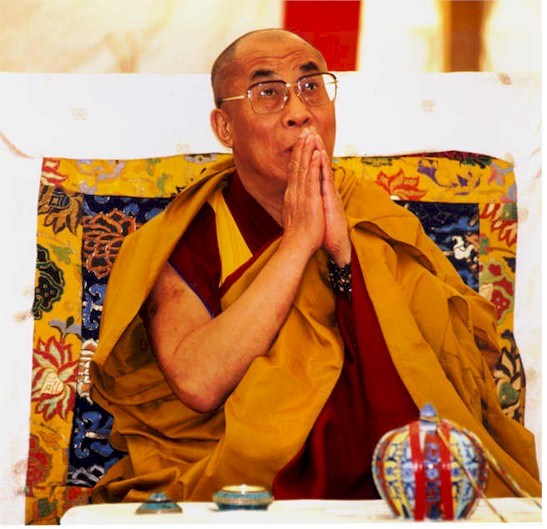 |
| The Dalai Lama praying (http://www.wireheading.com/dalai-lama.jpg (BLTC)) |
As the Dalai Lama once said, "It is necessary to help others, not only in our prayers, but in our daily lives. If we find we cannot help others, the least we can do is to desist from harming them." (Dalai Lama). This quote models exactly what the Dalai Lama struggles to give the world. He works endlessly, trying to solve the world's problems, and if he cannot resolve a conflict, he will never resort to violence as his answer. The Dalai Lama encourages people to go further beyond people's expectations and to help people that can make the future better. Lhamo Dhondup was chosen at a young age to start vigorous training to become the 14th dalai lama. March 10 of 1959, he was invited to a dinner by Chinese officials. Warned by his guiders that it was probably a trap, the Dalai Lama as well as many other Tibetans, escaped in exile into India. All these events in his life has prepared him to be one of the most exceptional Dalai Lamas. He is a spiritual leader to his people and is significant for "bringing Buddhism to Hollywood." He is one of the world's greatest philosophers and his innovative approach to matters makes him one of the most inspirational leaders in the world and always chooses to be conscientious, following the way that is right, working endlessly to try to make Earth a better and more enjoyable place.
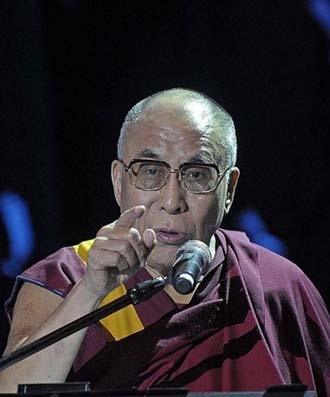 |
| The Dalai Lama public speaking (http://www.logoi.com/pastimages/img/dalai_lama_4.jpg ()) |
Non-violence, one of the Dalai Lama's most notable traits, helps him get to his apex of his life. "His Holiness the Dalai Lama is a man of peace. In 1989 he was awarded the Nobel Peace Prize for his non-violent struggle for the liberation of Tibet. He has consistently advocated policies of non-violence, even in the face of extreme aggression. He also became the first Nobel Laureate to be recognized for his concern for global environmental problems."(His Holiness The 14th Dalai Lama Of Tibet). The Dalai Lama's non-violent ways, can really help someone resolve conflicts. One of his most famous accomplishments, liberation in Tibet, has really made people see that he is an innovative public figure mostly because he campaigned peacefully the whole time. Regardless of having any personal gain in doing this, he pushed past any risks and aimed to free his own people from the Chinese. "At age 16, I lost my freedom. At age 24 I lost my own country," he said. "There are sufficient causes to be angry there. What good are those? Too much anger destroys my own health and anger won't solve the problem" (Lama). The Dalai Lama digs deep into the roots to find the problem of the cause and never stresses or argues over a single problem. His passivity has helped many overcome obstacles in life. The Dalai Lama peacefulness has solved many problems in his life which is why he is so effective in solving the world's problems and many others.
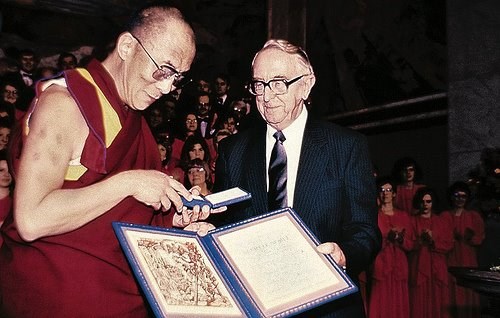 |
| http://blog.studentsforafreetibet.org/2010/12/the-dalai-lama-liu-xiaobo-and-how-the-nobel-peace-prize-is-changing-our-world/ () |
The Dalai Lama's conscientious behavior makes him feel like he has to the right thing at all times which makes him one of the world's greatest spiritual leaders. He frequently tries to solve arguments for the greater good and is always giving up sacrifices from his own life to help other people. "Despite his resignation, the Dalai Lama will continue to be Tibet's spiritual leader. The Dalai Lama is one of the most influential spiritual leaders in the world, yet he does not try to convert anyone to Buddhism." (Detroit:UXL, 2011). Ever since the Dalai Lama resigned from being Tibet's ruler, he still continues to lead on the Tibet through thick and thin, this is why I truly think the Dalai Lama is conscientious because he helps people so they can move on in their life without any regrets. The Dalai Lama forgets about nonessential needs to help a person in trouble, he always trying to make the right choice no matter if it is about his religion, or if they have troubles with themselves, he will always find a way for peace. Even in India when he was in exile, he continued to take on problems and to help people even though his own life was in danger. "This peace plan contains five basic components: Transformation of the whole of Tibet into a zone of peace; Abandonment of China's population transfer policy which threatens the very existence of the Tibetans as a people; Respect for the Tibetan people's fundamental human rights and democratic freedoms; Restoration and protection of Tibet's natural environment and the abandonment of China's use of Tibet for the production of nuclear weapons and dumping of nuclear waste; Commencement of earnest negotiations on the future status of Tibet and of relations between the Tibetan and Chinese peoples" (Address to the U.S. Congressional Human Right's Caucus). The Dalai Lama is extremely diligent, he has an eager to go out and help people all around the world so they can have a better life in the future. Offering his own time and devotion to his people, he worked endlessly so the Tibetans could be liberated.
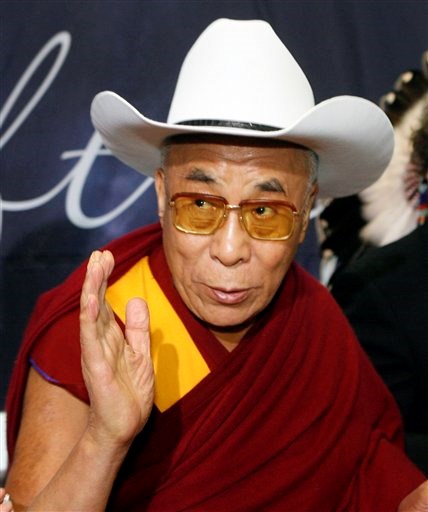 |
| http://cache.gawker.com/assets/images/7/2009/10/dalailama.jpg () |
The Dalai Lama's charismatic behavior gives off a cheerful mood all the time, which makes people believe in him as if he can help them with their issues. His characteristics make him a very enjoyable person to be around and is why his speeches and outdoor events attract a lot of people. "I accept the prize with profound gratitude on behalf of the oppressed everywhere and for all those who struggle for freedom and work for world peace," said the Dalai Lama in his acceptance speech. "I accept it as a tribute to the man who founded the modern tradition of nonviolent action for change--Mahatma Gandhi--whose life taught and inspired me. And, of course, I accept it on behalf of the six million Tibetan people, my brave countrymen and women inside Tibet, who have suffered and continue to suffer so much" (Amitabh). Humility is one of the Dalai Lama's characteristics that make him such an enjoyable person. Even though he has won one of the most prestigious awards in the world, he still remains happy but not showing any cockiness whatsoever. He knows people have suffered to protect him, which is why he must continue to aim for the very best for not only him and the Tibet people, but for everyone else in the world. The Dalai Lama has all of the most amazing attributes any man could have. "...his own personal warmth, humility, and compassion, have made him an international symbol of hope and inspiration to those advocating a kinder, more spiritual approach to resolving world conflict. In 1989, those very qualities earned him the Nobel Peace Prize. His reaction to the news was typically humble: "My case is nothing special. I am a simple Buddhist monk--no more, no less" (Detroit:UXL, 2011). The Dalai Lama thinks that what he has achieved in his life is because he was a simple Buddhist monk living up to his full potential. The Dalai Lama shows the personality of a great leader. His charisma gives off a aura of happiness as well as many other great traits. Although many people all over the globe sees him as a great person, he sees himself as a simple Buddhist monk, no more no less. His happiness and compassion makes him very appealing to many people which is why he is so successful as a philosophical leader.
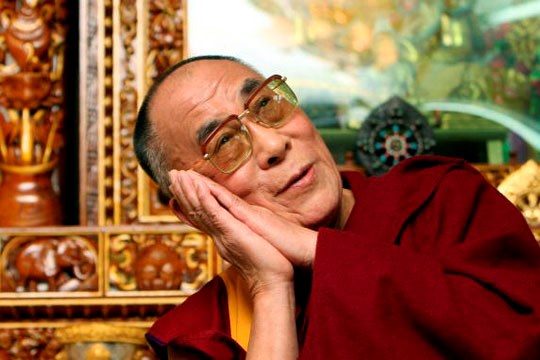 |
| http://www.vagobond.com/wp-content/uploads/2011/05/dalailama1.jpg () |
"There is no need for temples, no need for complicated philosophies. My brain and my heart are my temples; my philosophy is kindness." (Lama). The current religious spiritual leader of the Tibet people influences people in so many ways because of his creative ideas to promote peace throughout the whole world and his calm approach to many different matters. The Dalai Lama inspires so many people all over the world from all his hard work. He has become a beacon of light to those who need guidance along the way through their tough times. His famous quote, "I am a simple Buddhist monk - no more, no less" reminds people he is not some great hero coming down to save them, instead he is just a regular person living up to his full potential. The Dalai Lama works past everything thrown at him for the greater good so people can have a better life in the future. His never-take-no-for-an-answer mindset, charisma, and his nonaggressive ways make him one of the most likeable leaders in the world.
Works Cited
"Dalai Lama." World Religions Reference Library. Ed. Julie L. Carnagie, et al. Vol. 3: Biographies. Detroit: UXL, 2007. 91-99. Gale Virtual Reference Library. Web. 25 Mar. 2012.
"A Brief Biography." Dalailama.com. His Holiness The 14th Dalai Lama. Web. 17 Apr. 2012.
Lama, Dalai. "The Dalai Lama Quotes." BrainyQuote. Xplore. Web. 18 Apr. 2012.
Giambusso, David. "Dalai Lama Promotes Non-violence." The Star-Ledger. The Star Ledger, 13 May 2011. Web. 18 Apr. 2012.
"Dalai Lama." World Religions Reference Library. Ed. Julie L. Carnagie, et al. Vol. 3: Biographies. Detroit: UXL, 2007. 91-99. Gale Virtual Reference Library. Web. 25 Mar. 2012.
"A Brief Biography." A Brief Biography. Web. 18 Apr. 2012.
Page created on 10/21/2013 12:00:16 PM
Last edited 10/21/2013 12:00:16 PM
